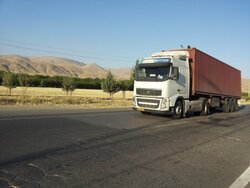
Transit of commodities via Iran rises 2.2% in a year

Ruhollah Latifi, who is the former spokesman of the Islamic Republic of Iran Customs Administration (IRICA), said that 12.912 million tons of commodities were transited via the country in the previous year.
Earlier this month, the deputy transport minister announced that Iran registered a new record high with the transit of 8.3 million tons of non-oil goods in 1401.
Shahriyar Afandizadeh said, “Considering the transit of 7.5 million tons of non-oil goods in 1400, we have seen a 10.7-percent growth in the transit of this type of goods in 1401 compared to the previous year”.
“In 1401, we witnessed important developments and achievements in the strategic and operational areas of the country's transit, whose definitive effects will be seen gradually and steadily on the growth of transit from the country in 1402 and the coming years”, the deputy transport minister further highlighted.
Afandizadeh then explained: “In line with the activation and development of the North-South International Transport Corridor, in a tripartite meeting in last September between the high-ranking officials of our country and the Russian Federation and the Republic of Azerbaijan in Baku, while aiming to achieve the transit of 15 million tons of goods through this corridor by 2030, agreements were reached in the field of strengthening the cooperation of the three countries in joint investment and financing, the completion and development of key infrastructures and their exploitation, especially the construction of the Rasht-Astara railway line, facilitating cross-border traffic of goods and increasing the quality and quantity of this traffic”, adding that the implementation of these agreements is being followed up.
He went on to say, “One of the most important events last year was Iran’s full membership in the Shanghai Cooperation Organization (SCO). In a short period of time after the meeting of the heads of Shanghai in September 1401 in Samarkand, the first six-party meeting of the transport ministers of Iran and the countries of Central Asia, in addition to Russia and Azerbaijan was held in Tehran in October 1401 with the goal of achieving 20-million tons of annual transit between Iran and Central Asian countries, as an area with a very high role and importance in east-west and north-south transit, especially after the recent regional and international developments, which was approved by the members.”
This year, the issue of transit and playing a role in major programs such as those related to China's Belt and Road Initiative, Shanghai Cooperation Organization, Economic Cooperation Organization (ECO), and Eurasian Economic Union (EAEU) is one of the main priorities of the Transport Ministry in developing transport relations with regional and extra-regional target countries, the deputy transport minister noted.
After seven years of reduction in the transit of goods from the country, the growth path of transit resumed in the past Iranian calendar year 1400 (ended on March 20, 2022) and with the passage of 12.65 million tons of goods through Iran, a growth of 68 percent was achieved.
The policy of paying attention to neighbors and developing political and economic relations with neighboring countries in the current government, increasing attention to road and rail routes in the world, and the efforts and cooperation of transportation and trade-related organizations in establishing or activating corridors through the country has led to significant growth in transit of goods through Iran.
Iran is one of the countries with a special status in trade and transit relations due to its strategic location and special geography, as the country is the passage of several important international corridors.
Considering its geographical location, Iran can play a significant role in the transit of goods in the region and benefit a lot from its status in this due.
Paying attention to upstream documents, especially the country's development plans, and the government's decision to develop transit, paying special attention to infrastructure development, reducing transit time, making it cheaper to cross Iran and making more advantages over competitors, due to the short path for customers, can lead to facilitating the development of transit so that the country can reach the desired growth in this due.
Source: Tehran Times


Trump weighs using $2 billion in CHIPS Act funding for critical minerals

Codelco cuts 2025 copper forecast after El Teniente mine collapse

Electra converts debt, launches $30M raise to jumpstart stalled cobalt refinery

Barrick’s Reko Diq in line for $410M ADB backing

Abcourt readies Sleeping Giant mill to pour first gold since 2014

Nevada army depot to serve as base for first US strategic minerals stockpile

SQM boosts lithium supply plans as prices flick higher

Viridis unveils 200Mt initial reserve for Brazil rare earth project

Tailings could meet much of US critical mineral demand – study

Kyrgyzstan kicks off underground gold mining at Kumtor

Kyrgyzstan kicks off underground gold mining at Kumtor

KoBold Metals granted lithium exploration rights in Congo

Freeport Indonesia to wrap up Gresik plant repairs by early September

Energy Fuels soars on Vulcan Elements partnership

Northern Dynasty sticks to proposal in battle to lift Pebble mine veto

Giustra-backed mining firm teams up with informal miners in Colombia

Critical Metals signs agreement to supply rare earth to US government-funded facility

China extends rare earth controls to imported material

Galan Lithium proceeds with $13M financing for Argentina project

Kyrgyzstan kicks off underground gold mining at Kumtor

Freeport Indonesia to wrap up Gresik plant repairs by early September

Energy Fuels soars on Vulcan Elements partnership

Northern Dynasty sticks to proposal in battle to lift Pebble mine veto

Giustra-backed mining firm teams up with informal miners in Colombia

Critical Metals signs agreement to supply rare earth to US government-funded facility

China extends rare earth controls to imported material

Galan Lithium proceeds with $13M financing for Argentina project

Silver price touches $39 as market weighs rate cut outlook

















